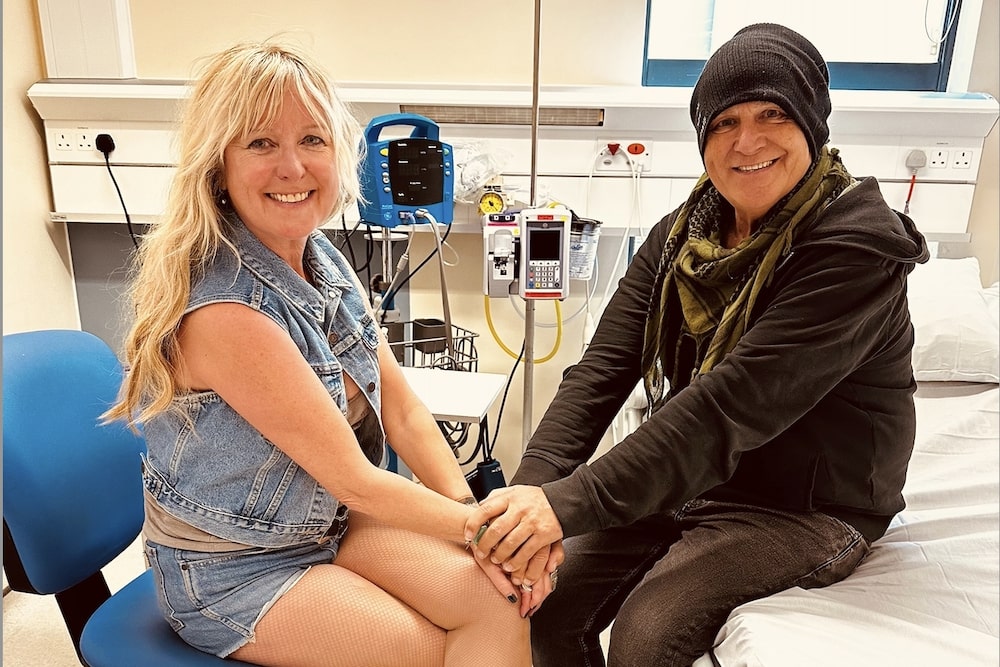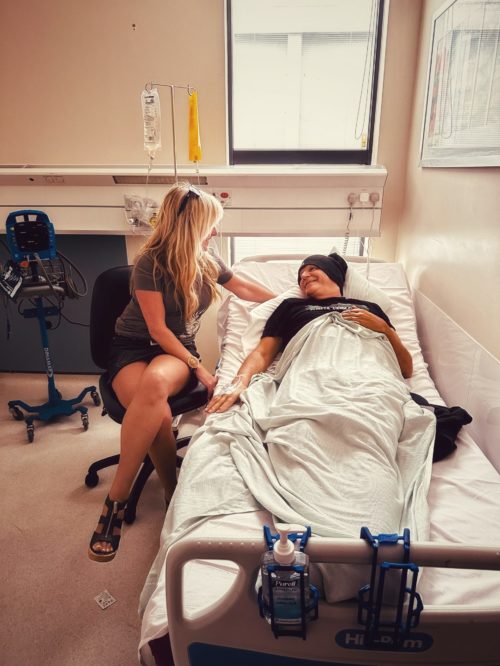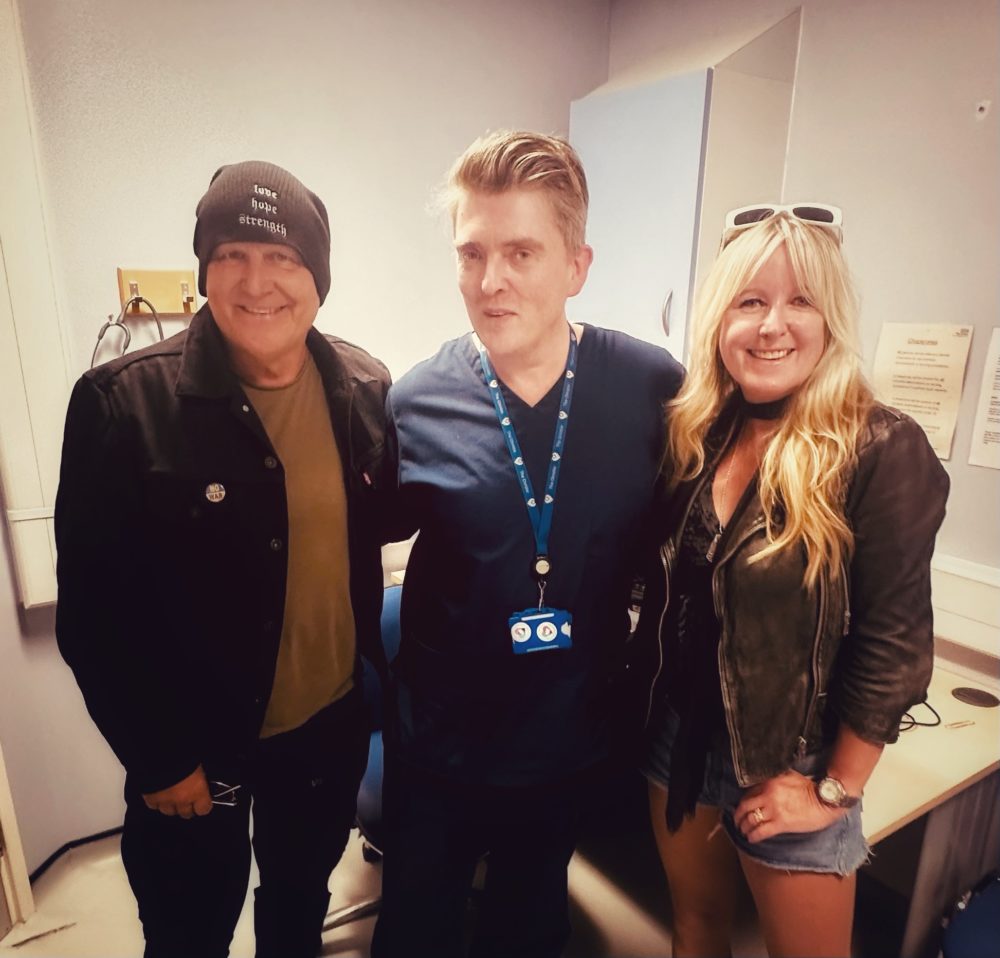Welsh rock legend in remission from aggressive cancer thanks to NHS trial

Mike Peters, frontman of The Alarm, is in remission from aggressive cancer thanks to an NHS drug trial.
The Welsh rock icon, who was forced to cancel a US tour earlier this year after being diagnosed with fast-growing lymphoma, has been given the all-clear following experimental therapy at the Christie NHS Foundation Trust in Manchester.
Peters, who has supported U2 and Status Quo on tour, was first diagnosed with chronic lymphocytic leukaemia (CLL) more than 29 years ago aged 36.
He has since undergone numerous drug treatments and rounds of chemotherapy, and had thought his cancer was being held in check.
However, in April this year, five days before he was due to fly to Chicago for a 50-date US tour, he noticed that a lump in his neck had appeared overnight.
Aggressive lymphoma
Doctors quickly realised the rock star may have developed Richter’s syndrome, where CLL changes into a much more aggressive lymphoma.
Speaking exclusively to the PA news agency, the 65-year-old said: “I was getting up at 6am to take my boys to Wembley to watch Manchester United in the cup, and I shaved…and there was a big lump in my neck.
“I didn’t think too much of it – I thought, ‘Oh, it’ll pass’. But as luck would have it, I’d arranged to meet my doctor the next day because I was going to America on the Saturday.
“I walked into the consultation, and I’d given blood, and (the doctor) said, ‘Mike, your blood count is absolutely plum normal, is there anything you need to tell me? Anything changed?’
“I said, ‘Well, I’ve got this big lump in my neck’, and he examined it, and his face went white…
“And by 3pm that afternoon, I was having an emergency biopsy.”
Peters, who is married to Jules, 57, and has two sons, Dylan, 20 and Evan, 17, then faced an agonising wait for the results.
“For two or three days, Jules and I had to wait,” he said. “We couldn’t cancel an American tour if I was just being given antibiotics…
“So we had a bit of tap dancing, it was quite a stressful situation. We had tour buses in place and flights…. very stressful.”

Soon, news came that Peters had Richter’s syndrome and would need to cancel his tour and start immediate treatment.
Without prompt action, doctors told Peters he only had a couple of months to live, which he said was a “huge shock”.
He added: “It was clear there was no way I would be able to go to America despite me pleading, ‘Can I just go for one week?’
“They said, ‘Look, Mike, this is a serious situation. We have to start now. You put this treatment off for a month, you might not be with us when you come back from America.’
“So at that point, I realised the seriousness of the situation, and I knew how to put my health first and the family. Music and business came second at that point.”
Peters was referred from the North Wales Cancer Centre near where he lives in Dyserth, to the Christie for specialist care.
There, he agreed to take part in a randomised phase II clinical trial investigating the combination of a targeted therapy called acalabrutinib with standard chemotherapy.

Although acalabrutinib is already approved for CLL, it has not been tested in combination with chemotherapy for Richter’s syndrome.
Luckily, the treatment has worked and a recent scan showed Peters is in remission.
Medics now want to find a suitable donor so the star can undergo a stem cell transplant, which should prevent the leukaemia taking hold again.
Peters said: “It’s amazing, especially when you go on the internet to look at other cases of Richter’s syndrome, which is not many, and you read that some people aren’t fortunate enough to get into remission so can’t proceed with other treatments.
“Having complete remission thanks to this trial has been incredible.
“I now need to find the right match for the stem cell transplant and, if it’s successful, and with the incredible help of the team at the Christie, endeavour to find a way to be cured once and for all.”

Peters credits his thousands of fans with giving him a boost, saying his diagnosis in April led to an “incredible” response, with “phenomenal support and prayers from the fans from all directions”.
He added: “I think, with my crazy instinct to try and preserve my life as well as my health, I worked out that I was able to play some British shows (this summer)…
“Luckily for me,they were all at the end of the chemotherapy cycles.
“I couldn’t do them with the band and the crew and the tour buses and all that, but I could stand up on the stage on my own with a small back-up team, so I wasn’t being exposed to any viruses or conditions that would impact on my health.”
In fact, Peters, who has an MBE for services to cancer charities, believes keeping focused has been key and he has been determined to “play gigs and focus on my music”.
He is concerned that radiotherapy may affect his voice and so he is hoping to avoid that, though he laughed: “I’ve had a great email from the Microsoft team saying ‘we can preserve your voice by banking it with artificial intelligence!’”
Breast cancer
Peters’ wife Jules has also recovered from breast cancer, having being diagnosed eight years ago.
She said: “Luckily, I was probably more prepared for everything that came… I was only 28 when Mike was diagnosed… so my life with Mike has primarily been living with cancer.
“I’m eight years on, so I remain confident.”

Professor Adrian Bloor, consultant haematologist at the Christie, said: “Richter’s syndrome is a rare disease affecting a small percentage of patients with CLL.
“There are still very few effective and well tolerated treatments with patients that develop this condition.
“It is hoped that the combination of acalabrutinib with chemotherapy will be effective in treating Richter’s syndrome and stopping it coming back.
“Once Mike has completed his course of chemotherapy, we will be looking to do the stem cell transplant in the autumn.”
Dr Richard Francis, deputy director of research at Blood Cancer UK, which is funding research into the new combined treatment, said: “All of us at Blood Cancer UK are pleased to hear that Mike responded well to treatment so far and continues to make good progress.
“It’s further proof clinical trials designed to rapidly assess what treatment combinations work, improves people’s lives.”
AstraZeneca provided the drug for the STELLAR trial, which is still open to recruitment and is aiming to sign up 60 patients across the UK.
Support our Nation today
For the price of a cup of coffee a month you can help us create an independent, not-for-profit, national news service for the people of Wales, by the people of Wales.




